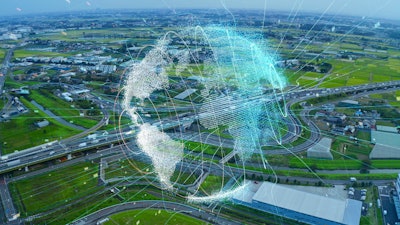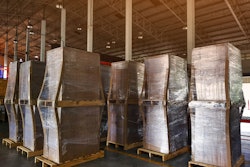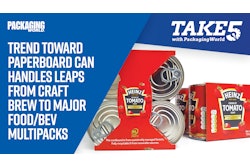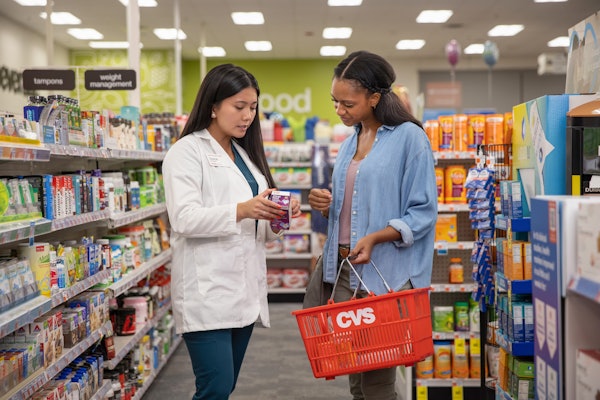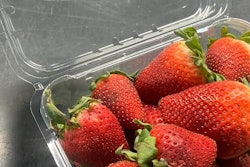Last week at the Natural Products Expo West, Alisha Real, Director of Sustainability and Social Impact at UNFI; Brenna Davis, VP of Social and Environmental Responsibility at PCC Community Markets; Deanna Bratter, Head of Sustainable Development at Danone North America, and Rebecca Hamilton, Co-CEO at W.S. Badger, spoke about supplier engagement as a climate strategy. The following content is edited for length.
Engaging supply chain partners to analyze their own impact on the environment is a key element to a sustainable climate strategy and brand transparency. Data transparency from distributors rose to the top when mentioning what is needed for a complete picture of sustainability – something that consumers are demanding from the brands they support.
“We're hoping to be able to collect more [data]” said Bratter, “and we do have sustainability requirements written into our contracts, but we have a lot more work to do on supply chain - reducing the opacity of our supply chain and really getting down to the nitty gritty, especially from the distributors. Give us the data. We need it, we'll use it.” She added, “Transparency can be scary because we're all trying to protect our business. We're trying to protect our brands and our relationships, but really evolving into a true partnership is going to take an enhanced level of trust…ultimately moving away from just a transactional relationship but being open to longer term commitments and contracts that will help us create the longer-term transformation that's needed in these spaces.”
Hamilton added, “If we have suppliers that are doing really great things and are able to share [data] with us, that's really helpful because we're trying to build a whole picture of what our impact is, and trying to be responsible and shift the needle forward, and the more we can partner with suppliers and share what we're doing and figure out ways that we can help each other, the further we can really start making more of a positive impact.”
“My advice would be around the idea that this issue is only heating up,” said Davis, “and the number one and two issues that are in the proxy season this year for shareholders were one, climate change and two, diversity. It's not going away. So, a smart supplier would start preparing now, and move quickly to deal with the climate impacts of their products and to start getting the data together so that they can disclose the carbon footprint of each product.”
Here is more of the discussion:
Brenna Davis:
PCC Community Markets is the nature nation's largest food co-op. We've grown to $383 million in sales, and we have 15 stores across the Puget Sound area. We were founded in 1953 and we've been working on sustainability since the 1970s - so that's over 50 years. In 2018, we rolled out arguably one of the most ambitious set of sustainability goals in grocery, that included carbon negative store operations, reducing emissions associated with refrigerant leaks by 50%, 100% renewable energy, and one really big goal was to eliminate petroleum-based plastic from our deli.
Rebecca Hamilton:
Badger is a much smaller company than my other co-panelists, but as a manufacturer and a smaller company, we have a little bit of a different story. Badger was started around 1995, and in 2011 we became a Certified B Corp and that really kicked us off on a journey of measuring our impact, understanding how to operationalize, looking at goal setting, creating an environmental monitoring system, and focusing internally on how do we mitigate our impact as a business?
We have around a 97% diversion rate for the waste that we create in manufacturing, but the vast majority of our impact is not actually at our factory, it's in our supply chains. And so that's really been our focus in the last several years and going forward into the future, is to look at the larger impact that we have, with a vision of saying that if we're a consumer products company that inherently has a net negative impact just by the fact that we create single use products, what would a future path look like if we could transform that into being a company that has consumer-based products with a net positive impact?
Deanna Bratter:
When we at Danone think about operational climate programs, we really see that how we source and engage across the supply chain can help not only shape our business, but it is absolutely one of the key levers in terms of how we create impact, whether that be positive or negative, and we refer to our supply chain as ‘value chain’ because we are taking an approach that leans into the idea that every single step along the process creates value, and creates impact, and so we work to create partnerships every step of the value chain to help understand what the opportunities are, and what the potential solutions are, to reduce our impact from a climate and emissions perspective, and increase our impact from a community building and resiliency perspective.
Pragmatically we work to understand all of our key areas of impact and really strive to embed it across the company. So, sustainability and sustainable development topics don't exist in a team, they exist everywhere - from finance who are looking at the cost of carbon, the impact and price of carbon to our business and across our supply chain, within our procurement team to the many individuals who are strengthening those partnerships in the supply chain, and in the value chain directly to create transformation.
And then we also take some really fundamental approaches like embedding social and environmental principles into our contracts so that every single contract with every supplier across the board understands what we're aiming for and has a role to play in participating.
Focusing on Supplier Engagement
Alisha Real:
Share a little bit about why you chose to focus on supplier engagement and how you built that into your climate strategy. What has that journey looked like at your company and how did you go about identifying some of those hot spots that you would focus on?
Brenna Davis:
One of our biggest initiatives that we've worked on with suppliers is really getting them engaged in the Climate Collaborative. We have an annual supplier vendor summit, and we educated our vendors about our expectations around sustainability, about our goals, about what we're working on, and about our efforts to reduce packaging in the supply chain, and asked them to sign on to the Climate Collaborative and really leveraged that network to help them improve their environmental footprint. We've gotten a lot of feedback from vendors that once they join, they realize a lot of benefits. In particular, one coffee roaster said they reduced their energy significantly and were able to improve their operations.
Deanna Bratter:
At our core Danone is an agriculture company. We are working to understand our footprint continually, and what is true is that two thirds of our carbon emissions come from our agricultural supply chain along with nearly 90% of our water use. So, when we're looking to understand what role we can play in our climate strategy and how we build that into the business, it starts with agriculture and it starts with our farmers.
Horizon Organic, the largest organic dairy brand in the US, made a commitment to become carbon positive across its entire value chain by 2025. So, from feed to farm, to glass of milk, engaging both the consumer and upstream as far into the system as we can go. The project itself looks at advancing soil health, prioritizing and strengthening farmer safety, animal welfare, and the carbon platform itself. Horizon has more than 600 family farmers. So, this is a partnership in every sense of the word.
It's really a collaboration, and one of those pieces is the Horizon Farmer Investment Fund, which is allocating $15 million directly for farmers to have low and no-cost loans so that they can implement practices, regenerative agriculture, soil health, to really start driving that transformation at the farm level and making sure that we're really creating solutions for them so that we can do this together, both Horizon and its farmers.
There's also a brand we have called Two Good, it's a fairly new yogurt brand, which is addressing the topic of food waste - one of the largest contributors to climate change - and we know some pretty staggering facts: A quarter to a third of food produced is wasted, and also exacerbated by the pandemic one in seven across the US does not have the food they need and suffers from food insecurity. So, Two Good is looking at the model of climate change through the food waste topic and really bringing together some partnerships. They launched a project called Good Save, which is rescuing fruit that would have otherwise been wasted and bringing it into the supply chain. So, it's an ongoing model of looking for waste in the channels.
When we think about examples of how we can really look uniquely through the brand lens and brand model as a company with 20 brands or so here in the US, we're looking at how we can uniquely use our business, partner with suppliers to create that change and transformation all the way through the value chain.
How to Build Relationships with Suppliers
Alisha Real:
I know that some companies worry that they don't have sufficient influence as a purchaser in their supply chain, maybe they shy away from supplier engagement for that reason, so I'm curious Rebecca, you mentioned your size…have you ever served this concern at any point? And if so, how have you gotten around it? How do you build those relationships with your suppliers to make change?
Rebecca Hamilton:
A core part of what Badger has done from day one, even when we were a company of three people, was to think about our supply network as partnerships and “how do we build a meaningful relationship” with a partner that is value aligned, that can help to build our brand, because most of our impact is coming through our supply network.
What we've done in recent years is invite our suppliers to come and meet with us and to discuss some of the areas where we intersect in terms of things that are mission aligned and help each other to grow in those areas. We went through developing a common language, areas that we needed to work on, areas that they needed to work on, giving them opportunities to present about things that they're really excited about, connect with other suppliers, and that networking helped to build those relationships.
Deanna Bratter:I think the B Corp model itself challenges companies to look into the supply chain and understand the impacts not only of your business, but the ripple effect into the community across all of your inputs, materials, and ingredients. As a B Corp, Danone North America and our brands are really taking that to heart and using it as a framework not only to understand and benchmark our performance, but to challenge ourselves to get to best-in-class in as many areas as we can. When you start thinking about your suppliers as part of your business in an integrated approach, it starts to bring in the need for collective decision-making together - and that idea of shared benefit and shared value.
Over the past 12 months, we have seen a pretty phenomenal shift. Three of the major suppliers in our value chain have used the B Corp model and become certified themselves. So, the opportunity and the ripple effect we're having into our supply chain is pretty powerful. This includes a major dairy producer, as well as a major almond supplier for our Silk beverage brand, and also a co-manufacturer.
